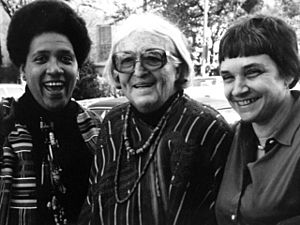Meridel Le Sueur facts for kids
Quick facts for kids
Meridel Le Sueur
|
|
|---|---|

Meridel Le Sueur (middle) with writers Audre Lorde (left) and Adrienne Rich (right) at a writing workshop in Austin, Texas, 1980
|
|
| Born |
Meridel Wharton
February 22, 1900 |
| Died | November 14, 1996 (aged 96) |
| Alma mater | American Academy of Dramatic Arts |
| Occupation | Writer, actress, stuntwoman, journalist |
| Movement | Proletarian literature |
| Spouse(s) | Harry Rice |
| Children | Rachel (b. 1928) and Deborah (b. 1930) |
| Parent(s) | William Winston Wharton, Marian "Mary Del" Lucy; stepfather, Arthur LeSueur |
Meridel Le Sueur (born February 22, 1900, in Murray, Iowa – died November 14, 1996, in Hudson, Wisconsin) was an American writer. She was known for her stories about the lives of working-class people. This style of writing is called "proletarian literature." Meridel was born Meridel Wharton. She later took the last name of her stepfather, Arthur Le Sueur. He was a former Socialist mayor.
Contents
Meridel Le Sueur's Life and Writing
Meridel grew up in a family that cared a lot about social justice. Her parents, William Winston Wharton and Marian "Mary Del" Lucy, were activists. Meridel was inspired by the stories and poems she heard from Native American women.
She first studied dance and fitness in Chicago. Then, Meridel moved to New York City. There, she lived in a community that believed in personal freedom. She also studied acting. Her acting career mostly happened in California. She worked in Hollywood as an extra in silent movies like The Perils of Pauline. She was also a stuntwoman in films.
When she was a teenager, Meridel started writing for liberal newspapers. She wrote about important issues. These included unemployment, migrant workers, and the fight for rights by Native Americans. By 1925, she became a member of the Communist Party USA. This was a political group that wanted to help workers.
Writing About the Great Depression
Like other writers of her time, Meridel wrote about the challenges faced by working people. This was during the Great Depression. This was a time in the 1930s when many people lost their jobs and money. She published articles in magazines like New Masses.
Meridel also wrote several popular children’s books. These included biographies like Nancy Hanks of Wilderness Road. She also wrote The Story of Davy Crockett and The Story of Johnny Appleseed. Another book was Sparrow Hawk.
Her most famous books are North Star Country (1945). This book tells the history of Minnesota from the view of its people. Other well-known works include Salute to Spring and the novel The Girl. The Girl was written in the 1930s but was not published until 1978.
In the 1950s, Meridel's writings were not published for a while. This was because of her political views. But in the 1970s, her work became popular again. She was seen as an early feminist. This means she had ideas that supported women's rights long before they became widely accepted. She also wrote poetry about nature and women's spirituality. One such book was Rites of Ancient Ripening. Her daughter drew pictures for this book.
Later Life and Travels
In the late 1940s and early 1950s, Meridel taught writing classes. She taught them in her mother's home in Minneapolis. Many young writers came to learn from her. She lived in the Twin Cities area for many years.
During the 1960s, she traveled across the country. She went to student protests on college campuses. She also interviewed many people.
In the 1970s, she spent a lot of time living with the Navajo people in Arizona. She would return to Minnesota in the summers. There, she visited her growing family and friends. Later in her life, she lived with her family in Minnesota.
"Women on the Breadlines"
One of Meridel's most famous works is "Women on the Breadlines." This short piece was written in 1932. In it, Meridel wrote about the difficulties women faced during the Great Depression. She showed how women were often limited in their roles. Many characters in this work were struggling women looking for jobs. Some had very few choices for work. Through this and other writings, Meridel helped open the door for future female artists. They could then write powerful poetry that mixed personal feelings with political ideas.
Legacy
Meridel Le Sueur is remembered in Minneapolis, Minnesota. There is a building named after her in the Cedar-Riverside neighborhood.
A song called "Go" by the Indigo Girls (from their 1999 album Come On Now Social) includes words inspired by Meridel's writing.
A play about Meridel's life was also created. It was called "Hard Times Come Again No More." Her friend, Martha Boesing, wrote it. The play was performed in Minneapolis in 1994.
Selected Works
- 1930s The Girl, novel
- 1940 Salute to Spring, short stories
- 1945 North Star Country, poems
- 1949 Nancy Hanks of Wilderness Road: A Story of Abraham Lincoln's Mother, children's book ISBN: 9780930100360
- 1951 Chanticleer of Wilderness Road: A Story of Davy Crockett, children's book
- 1954 The River Road: A Story of Abraham Lincoln, children's book ISBN: 9780930100377
- 1954 Little Brother of the Wilderness: The Story of Johnny Appleseed, children's book
- 1955 Crusaders: The Radical Legacy of Marian and Arthur LeSueur New York : Blue Heron Press, ISBN: 9780873511742
- 1973 Conquistadores
- 1974 Mound Builders
- 1975 Rites of Ancient Ripening, poems
- 1982 O.K. Baby
- 1984 I Hear Men Talking and Other Stories
- 1987 Sparrow Hawk, children's book
- 1993 Ripening: Selected Work, edited by Elaine Hedges, The Feminist Press.
See also
 In Spanish: Meridel Le Sueur para niños
In Spanish: Meridel Le Sueur para niños
 | Chris Smalls |
 | Fred Hampton |
 | Ralph Abernathy |

